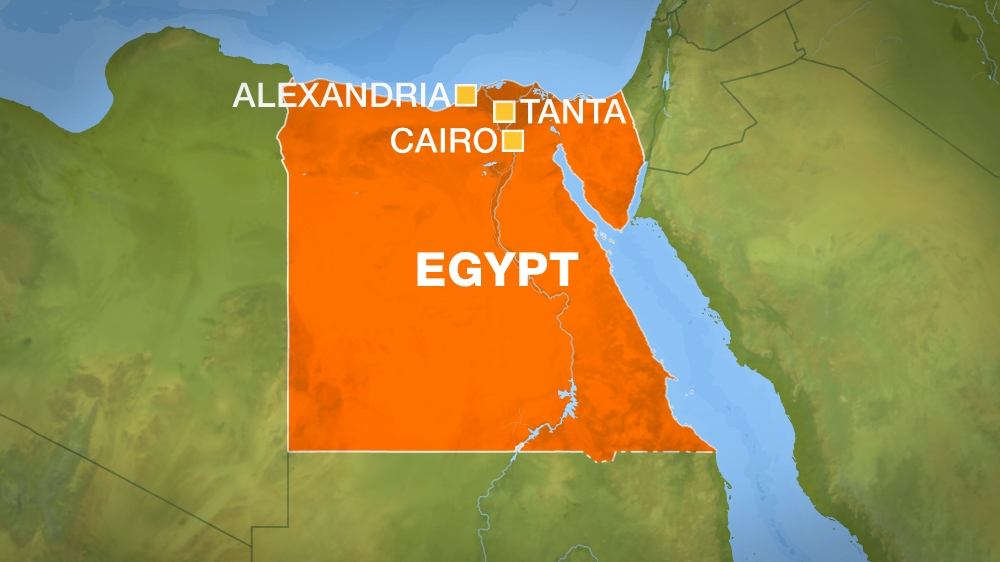Funerals held for victims of Tanta, Alexandria attacks
Three-month state of emergency declared after deadly bombings targeting Coptic churches in Tanta and Alexandria.

Funerals have been held for a number of victims of Sunday’s bombings targeting Egyptian Coptic churches that left at least 43 people dead and more than 100 injured.
At least 27 people were killed in Sunday’s explosion inside a church in the Egyptian Nile Delta city of Tanta, while another blast killed 16 in front of a church in the coastal city of Alexandria.
Keep reading
list of 4 itemsMoscow theatre attack suspects show signs of beating in court
Four men showing signs of severe beating charged over Moscow concert attack
Russia mourns Moscow concert hall attack victims as death toll rises to 137
The Islamic State of Iraq and the Levant (ISIL, known as ISIS) group claimed responsibility for the attacks, which occurred a week before Coptic Easter, with Pope Francis scheduled to visit Egypt later this month.
|
|
On Sunday evening, at St Mark’s church in Alexandria, bodies were brought in wooden coffins decorated with golden crosses to the churchyard where hundreds of sad and angry Copts were gathered and a priest was saying prayers.
A Muslim funeral was also held in El Behira province for one of the four policemen killed in the attack.
After the blasts, Egyptian President Abdel Fattah el-Sisi ordered troops be deployed across the country to help secure “vital facilities” and said a three-month state of emergency would be imposed.
“A series of steps will be taken, most importantly, the announcement of a state of emergency for three months after legal and constitution steps are taken,” Sisi said in a speech aired on state television.
The first attack occurred in the Coptic church of Mar Girgis, also known as St George, which was packed with worshippers marking Palm Sunday, a Christian feast commemorating the entry of Jesus Christ into Jerusalem.
Several hours after the bombing in Tanta, the second attack hit Saint Mark’s church where Coptic Pope Tawadros II was leading a service.
![A funeral for victims of a bomb explosion at Mar Girgis Coptic church in Tanta [EPA]](/wp-content/uploads/2017/04/051cbbeafebf41e98453891cad300a9c_18.jpeg)
Mohamad Elmasry, assistant professor in the department of communications at the University of North Alabama in the United States, says Egyptian governments “have often responded to violence and instability by resorting to the country’s emergency law”.
“The emergency law rarely works,” he told Al Jazeera. “It will do little to address the structural gaps in Egyptian security. These attacks highlight some of the animus that exists towards Christians in Egypt.
“It is true that violent attacks on churches will find no popular support in Egyptian society. But it is also true that there exists a broad sociopolitical bigotry against Christians.”
Pope Francis offered prayers for the victims.
“Let us pray for the victims of the attack unfortunately carried out today,” he said.
![Security personnel secure the scene of the bomb explosion in Mar Girgis church [EPA]](/wp-content/uploads/2017/04/df4137008e43449db8135a472e1d8230_18.jpeg)
Antonio Guterres, the UN secretary-general, also condemned the bombings. Speaking through his spokesperson, he said he hoped “the perpetrators of this horrific terrorist act will be swiftly identified and brought to justice”.
In a separate press statement, the Security Council called the bombings “heinous and cowardly”.
The bombings were the latest in a series of assaults on Egypt’s Christian minority, who make up about 10 percent of the population and have been repeatedly attacked by armed groups.
CBC TV showed footage from inside the church in Tanta, with a large number of people gathered around what appeared to be lifeless, bloody bodies covered with papers.
A bombing at Cairo’s largest Coptic cathedral killed at least 25 people and wounded 49 in December, many of them women and children, in the deadliest attack on Egypt’s Christian minority in years.
